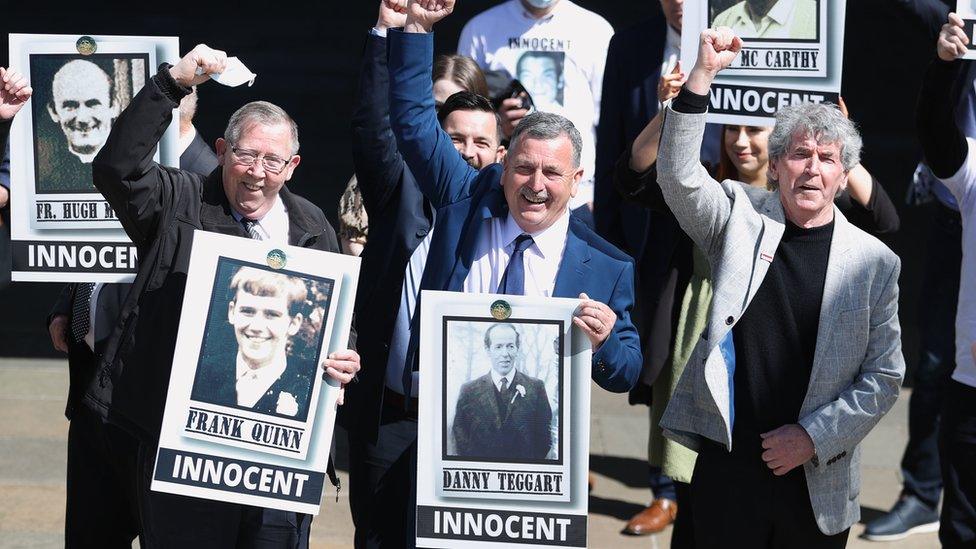Ballymurphy Inquest: Anger over manner of PM apology
- Published
Brandon Lewis had told families the PM would write to them
Relatives of the Ballymurphy victims have spoken of their anger over a written apology from the prime minister.
An inquest has found 10 people, who were shot in the wake of an Army operation in Belfast, were "entirely innocent".
Families received the letter from Boris Johnson on Thursday morning.
John Teggart, whose father Daniel was among the victims, said the tone and timing of the apology was unacceptable.
He said the letter was received minutes before Northern Ireland Secretary Brandon Lewis apologised in Parliament for "the events at Ballymurphy" in 1971.
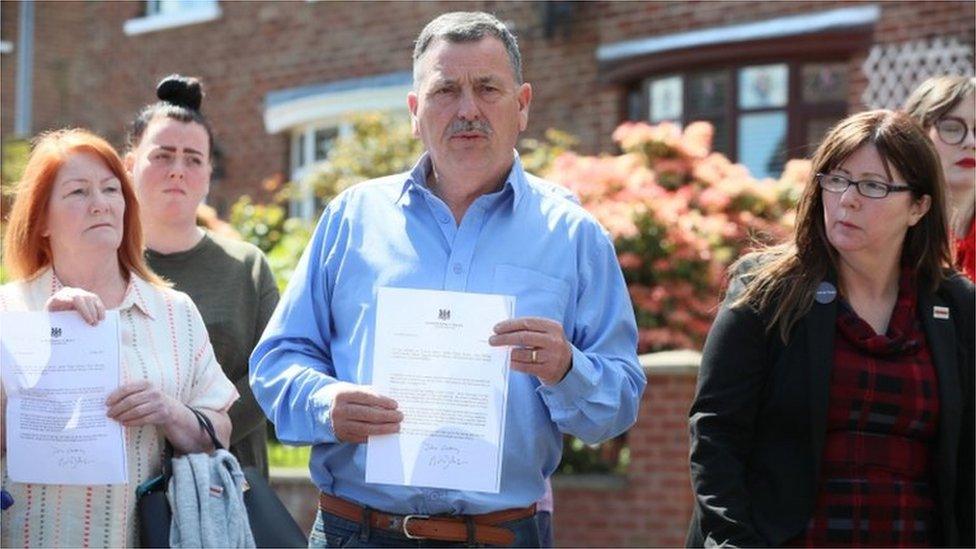
John Teggart (centre) made a statement on behalf of the families on Thursday afternoon
In a statement made after the families met to discuss the apology, Mr Teggart said: "The feeling in the room was anger. That's the emotion coming through from all the family members - anger."
'Meant nothing'
He added: "It's the manner of the apology, sending a letter two minutes before the secretary of state went live on TV. It's the timing.
"We hadn't asked for an apology. The words he put forward meant nothing."
Mr Teggart said Mr Johnson should have consulted with families about the contents of the letter.

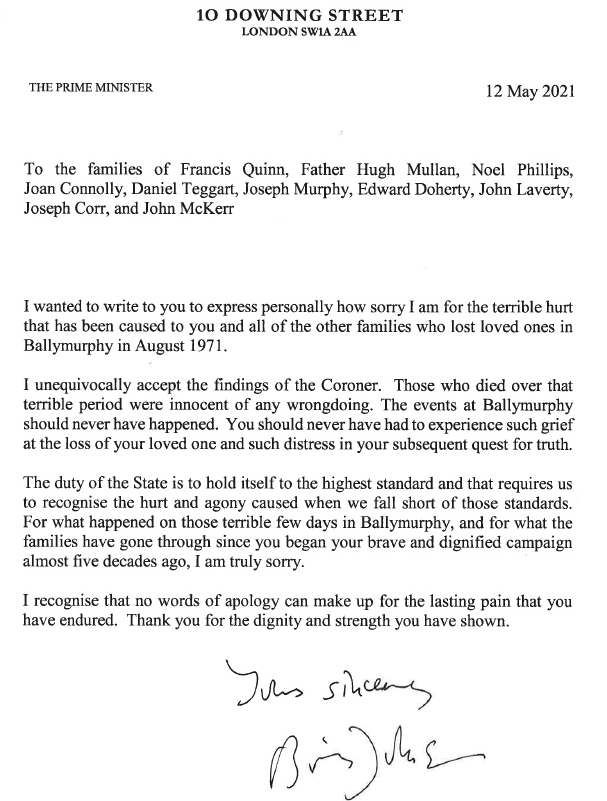

"The manner in which he has done this is totally unacceptable.
"We want Boris Johnson in the dispatch box, speaking to Parliament and to the world about what's happened in Ballymurphy. And we don't want him in the second line to start talking about a statute of limitations, taking away from what we have achieved."
Mr Teggart said the next step was to make "somebody responsible for [those] who killed our loved ones".
Janet Donnelly, whose father Joseph Murphy was killed in Ballymurphy, said Mr Johnson "didn't have the nerve to go into the House of Commons and make an apology himself".
"If he was in any way sincere with this, he should have done it right and he should have done it himself."
'It wasn't an event'
Carmel Quinn, the sister of victim John Laverty, expressed anger at the PM's use of the words "the events" to describe what happened.
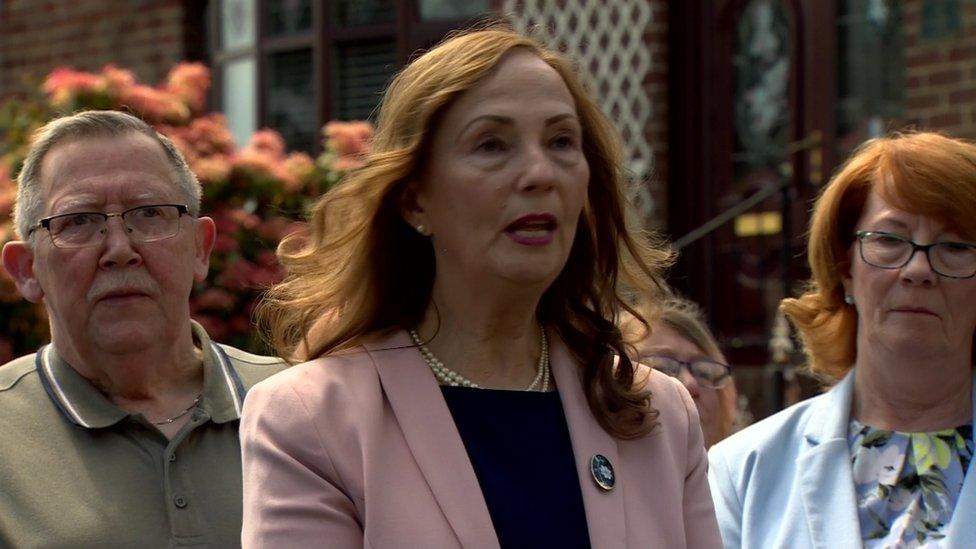
Carmel Quinn, whose brother John Laverty was killed, expressed her anger at the PM's wording
"It wasn't an event, it was an event. It was mass murder of a civilian population," she said.
In his statement earlier on Thursday, Mr Lewis said the UK government "profoundly regrets and is truly sorry" for what happened in Ballymurphy.
He said this also extended to the families for the "additional pain" they have had to endure and at how investigations were handled.
'Do this right - we want Boris Johnson at despatch box'
Briege Voyle, whose mother Joan Connolly was killed, said the families felt like they were being treated like "second class citizens" after discovering from a journalist that Mr Lewis was making the statement.
"Why could Boris not do it? Why could he not have stood up and give that apology?" she asked, in an interview with BBC NI's Talkback programme.
"Brandon Lewis is just like a puppet for Boris."
Mr Lewis had told Parliament Mr Johnson was writing to the families.
He said there was "no doubt what happened on those awful few days in Ballymurphy fuelled further violence and escalation, particularly in the early years of the Troubles".
"This government profoundly regrets and is truly sorry for these events, at how investigations after these terrible events were handled and for the additional pain that the families have had to endure in their fight to clear the names of their loved ones, since they began their campaign almost five decades ago," Mr Lewis said.
On Wednesday, Downing Street said Boris Johnson had apologised to Northern Ireland's first and deputy first ministers in a phone call.
However, on Thursday, Sinn Féin President Mary Lou McDonald said the PM did not apologise during that call.
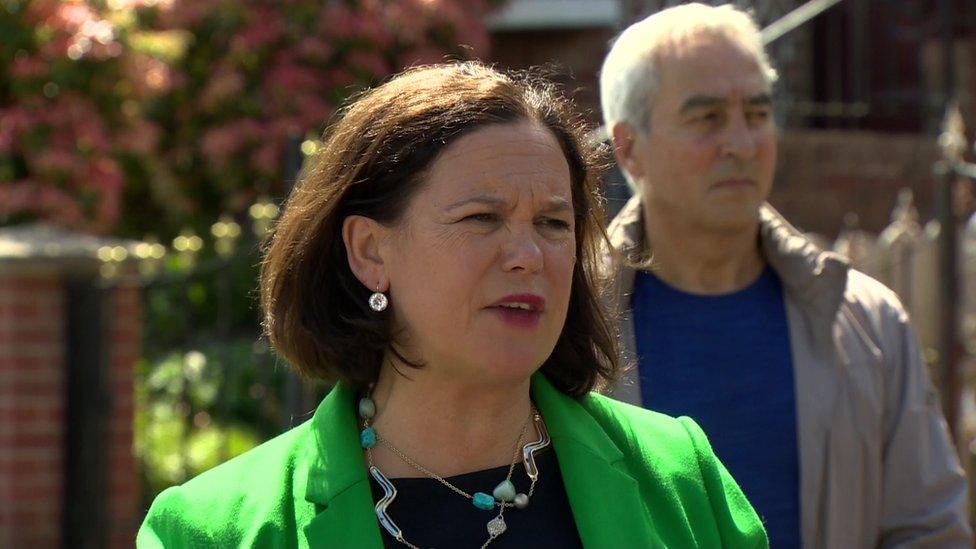
Mary Lou McDonald said the PM did not apologise during a phone call with the first and deputy first ministers on Wednesday
Speaking of his subsequent letter, she added: "A second hand apology is no apology at all."
Ms McDonald called on Mr Johnson to meet the families, who had shown "courage, dignity, resilience and stamina".
"I think Boris Johnson could do well to borrow from these families some of that dignity and the British system needs to recognise what happened here."
But some victims' families said the remarks should have been made in public.
On Thursday, Mr Lewis told Parliament he wanted "to put on record the government's acknowledgement of the terrible hurt" caused to the Ballymurphy families.
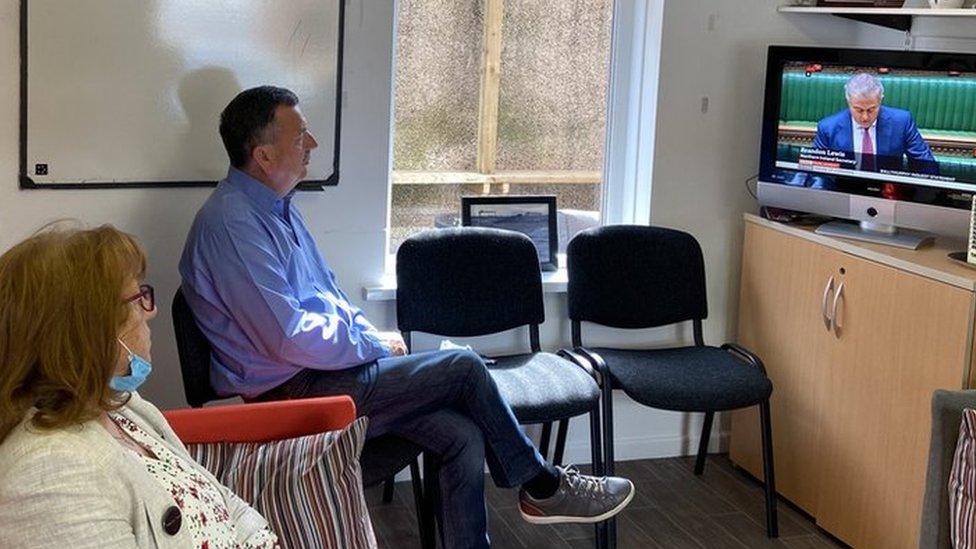
Briege Voyle and John Teggart, whose relatives were killed in Ballymurphy, watch the NI secretary deliver his address
Among the Ballymurphy victims were a priest who was trying to help the wounded, a mother-of-eight and a former soldier who had lost his hand in World War Two.
Nine of the 10 victims were killed by the Army, the coroner said.
However, Mrs Justice Keegan said she could not definitively rule who shot the tenth victim, former World War Two soldier John McKerr.
Mr Lewis said the events at Ballymurphy should never have happened.
"The families of those who were killed should never have had to experience the grief and trauma of that loss," Mr Lewis said.
"Above all, they should not have had to wait nearly five decades for the judgement this week, nor have been compelled to relive that terrible time in August 1971, again and again in their long and distressing quest for truth."
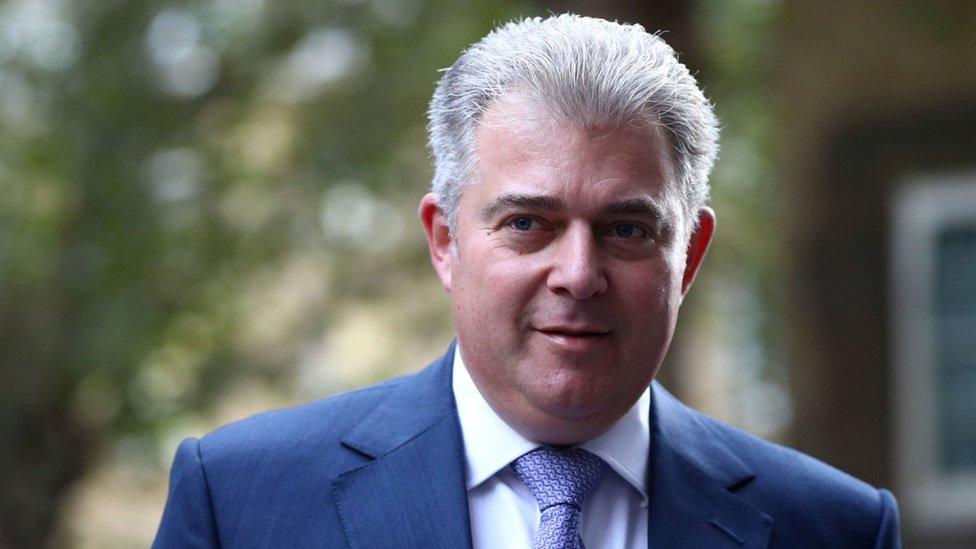
Brandon Lewis said the events at Ballymurphy should never have happened
He added that the desire for families of victims to know the truth about what happened to their loved ones was "strong and legitimate".
"Mr Speaker, this government wants to deliver a way forward in addressing the legacy of the past in Northern Ireland, which will allow all individuals or families who want information, to seek and receive answers about what happened during the Troubles, with far less delay and distress," he said.
"We want a path forward which will also pave the way for wider societal reconciliation for all communities, allowing all the people of Northern Ireland to focus on building a shared, stable, peaceful, and prosperous future."
A number of MPs, responding to Mr Lewis, said Prime Minister Boris Johnson should have delivered the apology to Parliament.
The Downing Street statement on Wednesday said the prime minister "apologised unreservedly on behalf of the UK government for the events that took place in Ballymurphy and the huge anguish that the lengthy pursuit of truth has caused the families of those killed".
'Where is the prime minister today?'
Shadow NI Secretary Louise Haigh told Parliament the fact that families have had to wait for so long was a "profound failure of justice".
"In the aftermath of the Bloody Sunday inquiry, David Cameron came to this House and apologised in a statement. He took full responsibility," she said.
"Where is the prime minister today and why has he not publicly apologised to the Ballymurphy families and to this House?"
Democratic Unionist Party (DUP) MP Gregory Campbell asked the secretary of state to ensure that the Ballymurphy families, or those of IRA killings, do not "suffer the ignominy of hearing about an amnesty".
The government is to bring forward legislation in the course of the next year to deal with legacy issues related to the Northern Ireland Troubles.
Based on details of the plan leaked last week, it is proposed that all prosecutions prior to 1998 and related to the Troubles will, in future, be banned under a statute of limitations.
Mr Lewis said it was important for the state to takes accountability for what happened in Northern Ireland, but added that it is important that "we get to the heart of what happened".


Amnesty is a word which dare not cross the lips of government as it sets out its latest change of approach around the legacy of the Troubles.
There has yet to be a clear, public enunciation of what is proposed.
But it is this: a statute of limitations which would ban all prosecutions related to the Troubles.
Not just future cases, but potentially, those already in train.
It would apply across the board - to army veterans and former paramilitaries - on everything which happened before the Good Friday Agreement in 1998.
The plan is the outworking of the government's pledge to protect soldiers who served in Northern Ireland.
Initial talks have taken place with political parties and meetings are planned with victims' groups.
Sources have told BBC News NI that there were many questions, but very few detailed answers from the Secretary of State Brandon Lewis.
The plan has been met with loud opposition.
Already, many are jumping ahead to whether the government, with the numbers at Westminster, will legislate regardless.
The legacy plan would involve some form of investigations for families of the bereaved.
But they would be investigations for the purposes of information recovery, not prosecutions.
The government believes this is the key.

SDLP leader Colum Eastwood said the Ballymurphy deaths were "sheer bloody murder".
"Will the secretary of state ask the prime minister to come out of hiding, come with me, meet the Ballymurphy families and tell them to their faces why he wants to protect the killers?"
Mr Lewis said the government would consider the report in more detail.
Alliance MP Stephen Farry said he wanted to focus on the "courage and dignity" of the families affected.
"Does it [Mr Lewis' apology] also include how the British Army libelled many of the victims by calling them IRA gunmen and also how the Ministry of Defence, and some individual soldiers, frustrated the process of justice over many years?" he asked.
'The past has become a swamp'
Denis Bradley, co-author of the Consultative Group on the Past Report, external in 2009, said a statute of limitations was "possibly workable" as court action to deal with the Troubles had led to a "hierarchy" for victims.
"For everybody who gets into a court or into a coroner's inquest, there will be 50 victims who won't get in there," he told BBC News NI's The View programme.
Mr Bradley, a former priest, worked with Lord Eames, a former Church of Ireland archbishop, to produce a document on ways to deal with legacy.
On Thursday, he said the criminal justice system "is not the place to do the past".
"The past has become a swamp for everybody and there's very little solid ground on which to build a resolution and a solution," he added.
Mr Bradley added that what many victims were searching for was "information" rather than court proceedings.
- Published12 May 2021
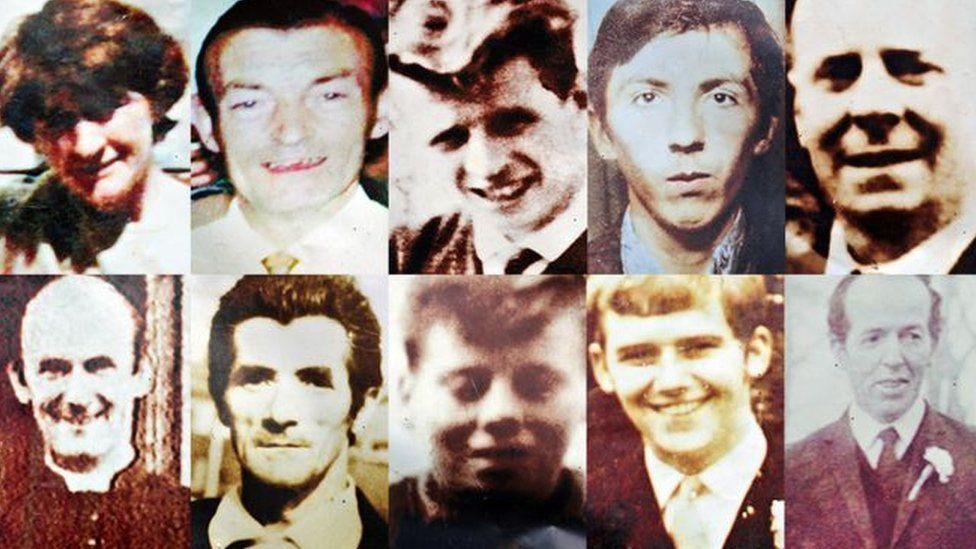
- Published11 May 2021
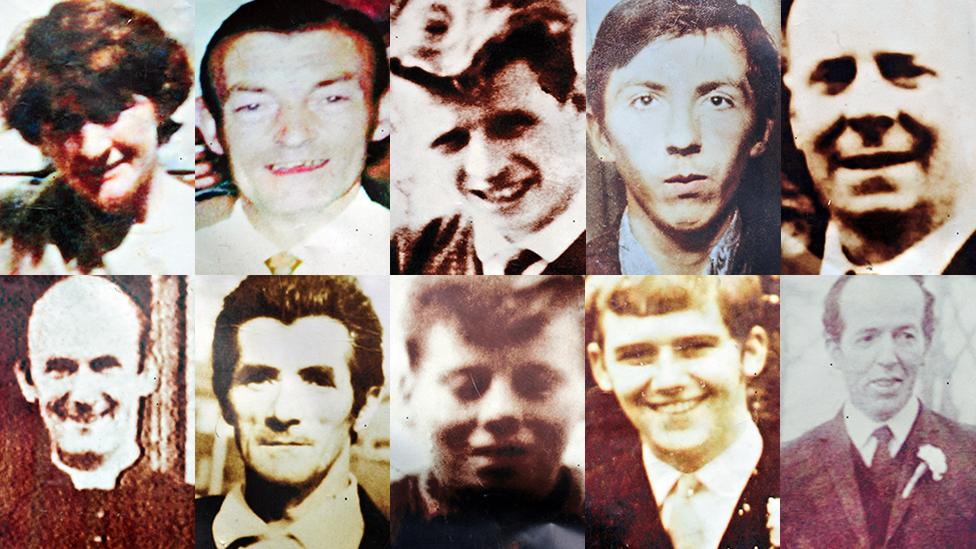
- Published11 May 2021
